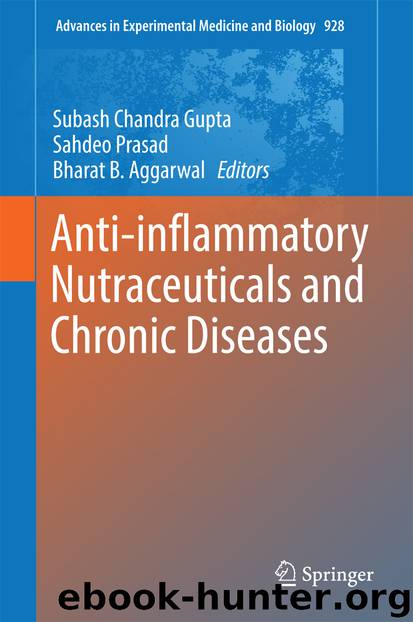Anti-inflammatory Nutraceuticals and Chronic Diseases by Subash Chandra Gupta Sahdeo Prasad & Bharat B. Aggarwal

Author:Subash Chandra Gupta, Sahdeo Prasad & Bharat B. Aggarwal
Language: eng
Format: epub
Publisher: Springer International Publishing, Cham
10.4.7 Fisetin and Colon Cancer
In Western countries, colon cancer remains one of the leading causes of cancer-related deaths. Modification of life style and diet habits, including consumption of vegetables and fruits can reduce the risk of colon cancer. Dietary flavonoid fisetin inhibited cell growth and clonogenicity of human colon cancer cells. Fisetin inhibited cell cycle progression in HT-29 cells by G2/M phase arrest. Fisetin treatment suppressed cdk2 and cdk4 activities resulting in a decrease in the level of cyclin E and D1 with an increase in p21 levels. Fisetin particularly targeted cdk4 activity in cell-free system, indicating that cdk4 may be the direct target of fisetin. In addition, fisetin treatment resulted in reduced phosphorylation (from hyperphosphorylated to hypophosphorylated) of retinoblastoma (Rb) proteins [107]. Moreover, cdc2 and cdc25c kinase protein expression and kinase activity of cdc2 were reduced in HT-29 cells after fisetin treatment. Induction of tumor suppressor gene p53 by fisetin contributes to apoptosis in human colon cancer HCT-116 cells harboring the wild-type p53 gene [108]. Fisetin-induced apoptosis was accompanied by reduction in expression of anti-apoptotic Bcl-2 and Bcl-xL proteins with concomitant increase in pro-apoptotic Bak and Bim proteins. Fisetin-induced mitochondrial translocation of Bax protein resulted in increased mitochondrial membrane permeability and release of cytochrome c and Smac/DIABLO from mitochondria to cytosol. In addition, fisetin treatment resulted in caspase-3 and PARP cleavage [108, 109]. Moreover, fisetin treatment inhibited protein expression and activity of COX-2 in HT-29 cells (COX-2 overexpressing colon cancer cell line), which are known to play a crucial role in colon carcinogenesis. However, fisetin treatment did not affect COX1 expression in HT-29 cells. Fisetin treatment also inhibited activation and translocation of NFκB, which are required for stimulation of COX-2 expression. PGE2 secretion was also reduced as a consequence of COX-2 inhibition by fisetin in HT-29 cells. Fisetin did not affect EP-2 and EP-4 expression, suggesting that fisetin inhibits COX-2/PGE2 signaling through regulating ligand availability. Moreover, fisetin treatment also inhibited phosphorylation of EGFR at the Tyr1068 residue in HT-29 cells as a consequence of PGE2 inhibition, which is a known transactivator of EGFR leading to promotion of tumor growth and invasion [109]. Furthermore, depletion of Securin expression (also known as pituitary tumor transforming gene and acts as a marker of invasiveness in colon cancers) sensitized human colon cancer cells to fisetin-induced apoptosis. Phosphorylation of p53 and cleavage of caspase-3 and PARP were enhanced in HCT116 securin-null cells or in wild-type cells in which securin was knock down [110]. Studies have also demonstrated that the apoptotic effect of fisetin on colon cancer cells (COLO205, HCT-116, HT-29, and HCT-15) is enhanced with N-Acetyl-L-Cysteine treatment, suggesting that fisetin-induced apoptosis in colon cancer cells is independent of ROS induction [111, 112].
Download
This site does not store any files on its server. We only index and link to content provided by other sites. Please contact the content providers to delete copyright contents if any and email us, we'll remove relevant links or contents immediately.
Sapiens: A Brief History of Humankind by Yuval Noah Harari(14368)
The Tidewater Tales by John Barth(12651)
Mastermind: How to Think Like Sherlock Holmes by Maria Konnikova(7323)
Do No Harm Stories of Life, Death and Brain Surgery by Henry Marsh(6938)
The Thirst by Nesbo Jo(6932)
Why We Sleep: Unlocking the Power of Sleep and Dreams by Matthew Walker(6706)
Life 3.0: Being Human in the Age of Artificial Intelligence by Tegmark Max(5547)
Sapiens by Yuval Noah Harari(5366)
The Body: A Guide for Occupants by Bill Bryson(5080)
The Longevity Diet by Valter Longo(5058)
The Rules Do Not Apply by Ariel Levy(4957)
The Immortal Life of Henrietta Lacks by Rebecca Skloot(4576)
Animal Frequency by Melissa Alvarez(4461)
Why We Sleep by Matthew Walker(4434)
The Hacking of the American Mind by Robert H. Lustig(4375)
Yoga Anatomy by Kaminoff Leslie(4358)
All Creatures Great and Small by James Herriot(4311)
Double Down (Diary of a Wimpy Kid Book 11) by Jeff Kinney(4261)
Embedded Programming with Modern C++ Cookbook by Igor Viarheichyk(4173)
